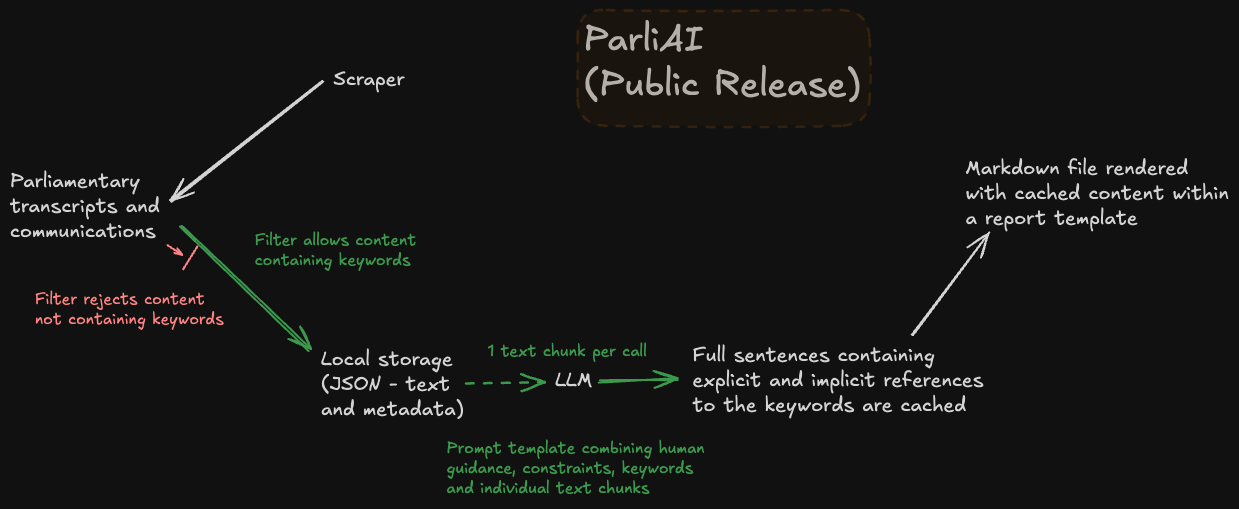This is the open-source code repository for the internal ParliAI project, allowing other developers to replicate non-sensitive features of the project and to encourage future collaboration and development in this space. Please do contact us at datasciencecampus@ons.gov.uk to discuss this or any of our other projects.
This demo is tested on the Gemma (1st release) model. It assumes that Ollama has been installed locally and the required model has been downloaded before using ParliAI. This is very easy to do and versions are available for Mac OS, Windows and Linux. For further information on installation and model downloads, you might like to refer to the Ollama GitHub page.
Internally, we have tended to use the Vertex AI microservice in Google Cloud Platform (GCP) to access both the Gemini and Gemma family of Large Language Models. However, Ollama gives free access to Gemma and doesn't require others to have a GCP account and architecture. We hope to add the feature back to the public repo to support developers who already have GCP access.
You are strongly recommended to install project resources into a virtual environment. Project setup can be achieved as follows:
$ git clone https://github.com/datasciencecampus/parliai-public.git
$ cd parliai-public
$ python -m venv venv
$ source venv/bin/activate
$ python -m pip install --upgrade pip
$ python -m pip install .[!NOTE] If you intend on doing any development work, please install the package as editable (
-e) and with thedevoptional dependencies:$ python -m pip install -e ".[dev]"Moreover, once you have installed the package, please install the pre-commit hooks. These hooks help us to ensure repository security and a consistent code style.
This repository contains a configuration of pre-commit hooks. These are language agnostic and focussed on repository security (such as detection of passwords and API keys). If approaching this project as a developer, you are encouraged to install and enable pre-commits by running the following in your shell:
-
Install
pre-commit:pip install pre-commit -
Enable
pre-commit:pre-commit install
Once pre-commits are activated, whenever you commit to this repository a series of checks will be executed. The pre-commits include checking for security keys, large files and unresolved merge conflict headers. The use of active pre-commits are highly encouraged and the given hooks can be expanded with Python or R specific hooks that can automate the code style and linting. We are using ruff to ensure consistent Python code formatting.
NOTE: Pre-commit hooks execute Python, so it expects a working Python build.
Although this product started out for internal use - with Office for National Statistics and ONS as search terms - users can specify keywords in this public edition. By amending the keywords variable in the src.parliai_public._config.base.toml, a parliamentary coverage report for different organisations, people or themes can be generated.
By default, parliamentary content from the previous day (and anything so far on the current day) will be reviewed. However, a number of flags are available for use from the command line to access historical content (as long as it is still available at source). The main time filtering behaviours can be summarised as follows:
- previous day (default) e.g.
$ python scripts/theyworkforyou.py- specify day with optional end date (
-dor--end) e.g.
$ python scripts/theyworkforyou.py -d 2024-05-20- range from start date (
-sor--start) to end date e.g.
$ python scripts/theyworkforyou.py -s 2024-05-20 -d 2024-05-24- look behind from end date (optional) by a specified window of days (inclusive;
-nor--window) e.g.
$ python scripts/theyworkforyou.py -d 2024-05-24 -n 3Additionally, the -w or --weekly flag can be used to generate a report for the previous week e.g. a Wednesday to a Wednesday. The -f or --form flag can also be applied to specify a preferred date format (other than the default of %Y-%m-%d).
An additional step has been added, at the post-processing stage, to verify LLM responses as being direct extracts from the original transcripts. Comparisons are made by sentence once all punctuation has been removed. Where this condition is not satisfied, the LLM response(s) is still used in the final report but a user warning is appended as a reminder to exercise caution when consuming AI-generated content.

At the Data Science Campus we apply data science, and build skills, for public good across the UK and internationally. Get in touch with the Campus at datasciencecampus@ons.gov.uk.
The code, unless otherwise stated, is released under the MIT Licence.
The documentation for this work is subject to © Crown copyright and is available under the terms of the Open Government 3.0 licence.
-red)

